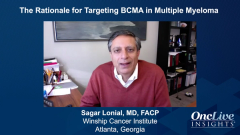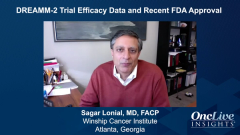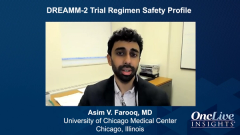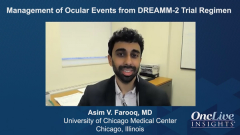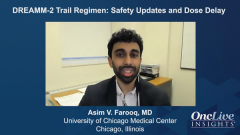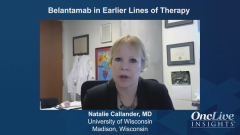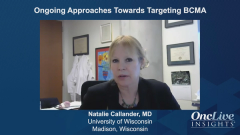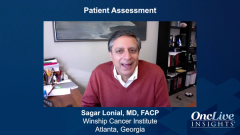
Next Steps for Use of Belantamab in Clinical Practice
Episodes in this series

Natalie Callander, MD: What we are probably going to be seeing more and more with belantamab mafodotin is that it is going to be combined with other agents and used earlier in the lines of therapy. There are some exciting phase 3 trials that are going to get underway shortly. One is being led by Robert Rifkin, MD, FACP, where he is using belantamab mafodotin in combination with Velcade [bortezomib] and dexamethasone and comparing that to daratumumab, Velcade [bortezomib], and dexamethasone. That is going to be a large international trial for people who have had previous treatment. There is a large study called DREAMM-9 where up front, patients are going to be randomized to receive Velcade [bortezomib], Revlimid [lenalidomide], and dexamethasone with or without belantamab mafodotin. Right now, that study is going to open to try to figure out what the ideal dosing is for the agent. It is probably likely that the Q3 [every 3] week schedule of belantamab mafodotin is going to change with some of these combinations where there might be some other toxicity issues. Lots of different drugs are going to be combined.
Right now, it is essentially for triple-refractory disease after 4 lines of therapy, but in at least some of the preliminary studies, like the study done by Ajay Nooka, MD, MPH, FACP, who presented some updated data on his combination of belantamab mafodotin with Velcade [bortezomib] and dexamethasone, it looks promising with high response rates. A combination like that would be carried forward a bit earlier. Particularly, it is going to be moving up because as daratumumab and other CD38 antibodies like isatuximab are going to be used in the frontline setting, there is going to be a consideration to use an anti-BCMA antibody much earlier in the lines of therapy, particularly if someone is on a CD38 agent when they progress since there are several maintenance trials going on looking at anti-CD38 antibodies post-transplant.
There are now going to be any number of agents that are targeting BCMA for obvious reasons; BCMA is a great target. One of the things that we do not know is about the sequencing of this agent, belantamab mafodotin, compared to a CAR T [chimeric antigen receptor T-cell] transplant that is BCMA directed, or a bispecific engager that is BCMA directed. There is a small study that was published looking at the use of belantamab mafodotin after some CAR T progressions. That looks interesting. We are going to be trying to figure out in the next year or two what sequencing is appropriate, or if you can go back and retreat patients with a different BCMA agent.
One of the most interesting trials that we [at the University of Wisconsin] have been able to be involved in is called DREAMM-5. This is a study that is combining belantamab mafodotin with some interesting agents that are essentially T-cell agonists to try to help with some immune response. We are interested in those drugs. One is combining ICOS [inducible T-cell costimulators], and there is also going to be a PD-L1 inhibitor. We are interested in looking at some of those combinations that are moving away a bit from the less traditional type of chemotherapy and more into the immunomodulatory type of drugs. We are interested in that.
Transcript Edited for Clarity


